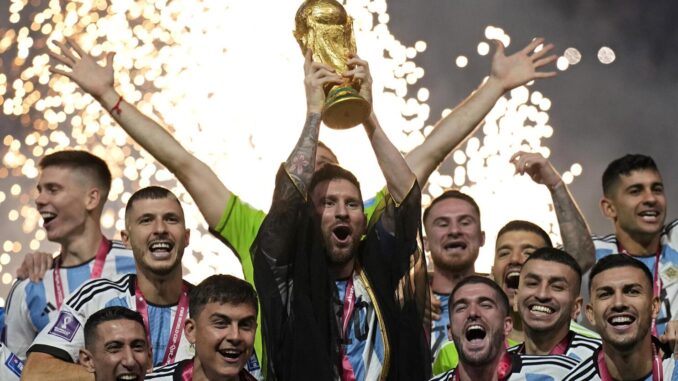
How Argentina Could Cope Without Messi: A Post-Messi Era
Lionel Messi has been synonymous with Argentina’s football identity for almost two decades, shaping the national team’s successes and defining their playing style. As one of the greatest footballers of all time, Messi’s presence on the field has been a source of inspiration, confidence, and tactical advantage for the team. However, the day will inevitably come when Argentina has to cope without their iconic number 10. The question, then, is how Argentina would navigate the post-Messi era, both in terms of footballing identity and on-field performance.
The Legacy of Messi
Messi’s impact on Argentina is not just statistical—though his records speak volumes. He is the national team’s all-time top scorer and has played in multiple Copa América and World Cup finals, winning the 2021 Copa América and the 2022 FIFA World Cup. His ability to perform in high-pressure moments has been critical in lifting Argentina from despair to glory on several occasions. Moreover, Messi’s technical skill and vision have made the team play a brand of football that balances creativity with tactical discipline.
His departure will leave a gap not only in terms of talent but also in leadership. Messi has been the undisputed leader, a player who could carry the team through tough times, and an individual who possessed the kind of brilliance that could turn the tide of any game. Replacing such a player—someone who combines technical ability, tactical intelligence, and psychological strength—is a monumental task.
The Post-Messi Transition
The transition to a post-Messi Argentina will require a rethinking of the national team’s structure. The first consideration will be leadership. Argentina’s future captain may come from a new generation of players, with talents like Enzo Fernández, Lautaro Martínez, and Cristian Romero emerging as potential leaders. These players, though still developing in terms of their international experience, have shown leadership potential in both club and country.
In terms of playing style, the departure of Messi could prompt a shift away from the reliance on individual brilliance. While Argentina has often built their strategy around Messi’s vision and playmaking, future teams might focus more on collective football. This could involve a greater emphasis on the tactical setups of coaches like Lionel Scaloni, who has already shown a preference for balanced, team-oriented football, as seen in Argentina’s 2022 World Cup campaign.
The Rise of New Talents
One of the silver linings of Messi’s eventual retirement will be the emergence of new talents who will be given more opportunities to shine. The youth system in Argentina is robust, and there are many promising players waiting to step into the spotlight. Players like Julián Álvarez, Alexis Mac Allister, Thiago Almada, and Paulo Dybala could form the nucleus of the next generation of Argentine football.
While none of these players may be able to replicate Messi’s unique combination of vision, dribbling, and goal-scoring, they each possess qualities that could allow the team to adapt. Álvarez, for example, has shown an impressive ability to find space and score goals, while Dybala is a gifted playmaker who can create opportunities in a manner somewhat reminiscent of Messi. Mac Allister and Almada have also demonstrated technical proficiency and intelligence that could help shape the future of Argentina’s midfield.
This next generation could benefit from a more holistic approach to football, one that emphasizes teamwork, defensive solidity, and a more versatile offensive system. The development of these players will be crucial, as the team will need to cultivate new stars who can shoulder the responsibility of leading the national team, both in terms of performances and in representing the country’s footballing culture.
Tactical Adjustments
Argentina’s tactical setup might also evolve. Messi’s individual brilliance has often meant that the team played in a way that revolved around him—building up attacks through his passing, dribbling, and movement. Without him, Argentina might need to adopt a more fluid and less Messi-centric system. This could involve a focus on direct attacking football, with fast transitions and a more team-oriented approach to possession.
The national team might also find more success in emphasizing pressing and high defensive lines, which have become increasingly popular under modern coaches like Scaloni. Argentina has already made significant strides in this area, with players like Rodrigo De Paul and Leandro Paredes able to contribute defensively and offensively. A cohesive unit built on pressing, defensive resilience, and collective attacking movement could replace the reliance on one single player.
Mental and Emotional Impact
Finally, Argentina will need to cope with the emotional and mental toll of Messi’s departure. His leadership, presence, and the psychological boost he gave the team will be hard to replace. The team will need to develop a new sense of identity and pride without Messi. However, the World Cup win in 2022 and the Copa América in 2021 have already begun to pave the way for this transition. Argentina’s victory in Qatar proved that the team can win without Messi being the focal point in every match.
In the long run, Messi’s legacy will live on in the hearts of Argentina’s fans and players. The national team will remember his contributions, and his influence will continue to shape the way future players approach the game. However, with the development of new talents, tactical evolution, and a team-oriented mindset, Argentina has the potential to remain competitive at the highest level even without their legendary number 10.
Conclusion
While Lionel Messi’s departure from the Argentine national team will undoubtedly be a defining moment in football history, Argentina has the resources and the talent to cope with life after Messi. With a strong footballing infrastructure, an emerging generation of talented players, and the tactical guidance of experienced coaches, Argentina will adapt and find new ways to compete at the highest levels. The post-Messi era will be a challenging but exciting new chapter for Argentine football, one that will likely honor Messi’s legacy while forging a path forward in his absence.
Leave a Reply